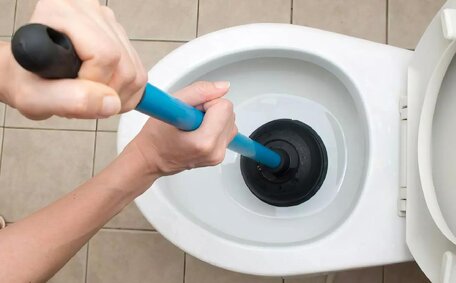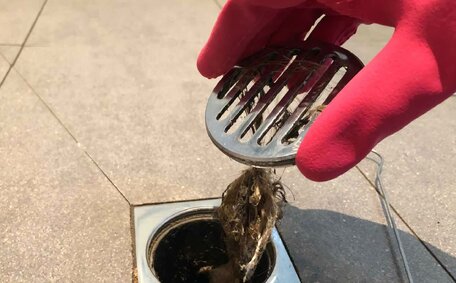
How to Prevent Household Blocked Drains
Blocked drains can be prevented by using drain strainers, avoiding pouring oils down drains, clearing hair from drains, and more tips from Seven Hills Plumbing.
Read MoreBlocked drains are a common plumbing issue that can end up causing major inconvenience in homes and businesses. Located in Seven Hills, Sydney, Seven Hills Plumbing offers a wide range of services to tackle any plumbing problem, including blocked drain clearing and maintenance.
Promptly addressing blocked drains is crucial to avoid health hazards and prevent further damage to your plumbing system. Blockages, a common cause of disruption in water flow within your drainage system, can result in backups and flooding. Left untreated, serious blockages can also result in problems for property owners, with sewage infiltrating their property.
In this article, we present an examination of the most common blocked drains causes and provide tips on how to unblock and prevent them. When it comes to blocked drains, acting quickly at the first signs of a problem is the best way to avoid costly repairs.
Households and businesses commonly encounter several causes for blocked drains.
Accumulations of fat, oil, and grease in drain systems are among the primary contributors to blockages. As these substances cool and solidify, they cause blocked pipes by creating a thick buildup into the drain over time. Food scraps that cause blocked drains can combine with grease deposits, exacerbating the clogs.
Kitchen sinks frequently face blockages due to cooking oil, grease, and fats poured down the drain. However, your bath drains get clogged from hair products and soaps, which can get infused with greasy residues.
Loose hair washed down the drain can overburden your plumbing drainage system, becoming a significant cause of clogs. Shower and bathroom sink drains commonly become blocked by hair making its way down the pipes.
Laundry drain pipes from washing machines also frequently succumb to clogs from hair gathering. When it comes to addressing loose hair, using hair catchers and strainers can easily minimise the amount going down your drains.
Invasive tree roots can infiltrate sewer and drain lines, gradually causing blockages over time. Damages and cracks in exterior drainage pipes are major reasons roots can penetrate and thrive, disrupting water flow.
Tree root growth is a particular cause of drain blockage in aging drainage systems; understanding the know-how to unblock drains can prevent costly root damage. Understanding drains, their functioning and conducting periodic video inspection can help prevent costly root damage.
Various items, when flushed down toilet or washed down sinks and tubs, can cause obstructions. Common foreign objects that clog drains include sanitary items, dental floss, kitty litter, coffee grounds and toys flushed down toilet.
Putting the wrong items down your drains leads to buildups of debris that narrow pipe diameters. Avoid flushing anything besides toilet paper and human waste down your toilets.
Individuals often wonder 'why my drains are clogged?' and discover that grease and fat are major culprits due to their tendency to solidify and cling to the inside walls of pipes. As grease cools, it turns into a thicker consistency, contributing substantially to clogged drains as it sticks to pipe surfaces. Over time, this causes a gradual build up that narrows the diameter of drain lines.
Substances like fat and oil washed down the drain can rapidly lead to significant plumbing issues. Instead, these should be collected in containers and discarded with solid wastes.
However, bathroom drains can also get clogged from greasy substances in soaps, shampoos and hair products. Using drain strainers and limiting grease poured down any drain can help prevent blockages.
While small amounts of grease may wash away without issue, over time it accumulates and sticks to pipe walls. This greasy coating captures food particles and other debris, creating a dense mass that blocks water flow.
Loose strands of hair washing down bathroom and laundry drains are a prime cause of clogs. As hair collects in pipes, it can tangle together with soap residue, grease and other debris to form dense obstructions.
Hair catchers or screens over drains are the most effective method to trap blocked strands, stopping loose hair from going down pipes in the first place. Hair catchers strategically placed down over shower and sink drains capture strands before they can accumulate into clogs.
It’s crucial to remove hair clumps from brushes and combs before washing to prevent them from going down the drain. Using hair capture devices, limiting hair sent down drains, and periodically clearing out pipes are key ways to prevent hair-related clogs.
Flushing unsuitable items down the toilet commonly leads to the need for fixing blocked drains. Items like disposable wipes, cotton buds, dental floss, and sanitary products do not break down easily and can cause buildup or become tangled or stuck in pipes.
These materials get stuck together with fats, debris and other solids, worsening blockages.
To avoid blockages from foreign objects, it’s important to only flush toilet paper and human waste. Some other items, including sanitary and hygiene products, should be disposed of in the garbage. Teaching children proper toilet usage is a key strategy in preventing inappropriate items from being flushed.
Sewer pipes are designed to efficiently transport specific waste items. Flushing anything besides toilet paper and human waste places strain on your drainage system and risks clogs, backups and damage.
Although some \"flushable\" wipes and other products may disappear down the toilet, they often re-form into obstructions further down the sewer lines.
Educating children on prts grow, they obstruct pipes and disrupt water flow.
Outdoor drains can become blocked by dirt, leaves, and refuse washed in during heavy rains. Installing drain covers and clearing drains before wet weather can help prevent outdoor clutter from blocking pipes.
Inspection and cleaning of external drains and sewer lines can catch root intrusions and debris buildup before a blocked drain in your system becomes a major problem. Addressing minor pipe invasions early is much easier than removing established root blockages in water systems.
Improper pipe installation is another preventable cause of common blocked drain issues in your drainage system. If pipes are not properly sloped, aligned or connected, it can lead to water failing to flow correctly. Low spots and dips in pipes cause sediment, grease and other debris to accumulate into clogs.
We strongly advise using qualified professionals for plumbing projects to ensure work meets proper standards and minimizes blockage risks. Incorrectly sized piping can also contribute to reduced water flow and drainage capacity, necessitating additional work done. Always hire licenced professionals for any drain or sewer line installations.
Ensuring that your hot water system is installed with proper practices, such as mechanical joint connections and sufficient pipe slope, reduces blockage risks. Periodic inspections of original piping can identify problems before major clogging and backups occur. Addressing minor installation defects early prevents headaches down the road.
Hard water contains high levels of minerals like calcium and magnesium. As this water flows through pipes, the minerals can build and bind to surfaces, accumulating over time. Soap scum buildup occurs when soap residues react with minerals to form sticky deposits.
Anyone can use techniques to reduce these mineral scales and soap scum buildups, which gradually narrow pipe diameters, impeding water flow. Showerheads, sink drains, and toilet tanks are common sites where a good drain cleaner can address clogging coming your way from hard water and soap residue.
Installing water softeners is an effective solution for reducing mineral deposits within your water system pipes. Softened water contains fewer minerals that can cause accumulation. Periodic drain cleaning with descaling solutions can also help remove existing buildup.
Vinegar, citric acid and commercial drain cleaners designed to dissolve mineral deposits may be used to break up hard water and soap scum. Maintaining adequate water flow and addressing buildup early prevents severe clogging issues.
There are several effective strategies on drains how unblock and prevent them in your home to keep your plumbing system flowing freely.
- Install sink strainers to catch food scraps and debris. Empty strainers regularly.
-
- Limit the disposal of food waste into the drains to avoid overloading them with food particles.
- Clean sinks after use to remove Grease and grime before it can build up.
- Use hair catchers/screens in shower and sink drains to trap loose strands.
- Dispose of hair from brushes and combs in the trash.
- Make sure to avoid flushing anything besides toilet paper and human waste.
- Use drain clearing tools monthly to remove accumulated hair and soap scum.
- Install covers or grates on exterior drains to keep out debris.
- Regularly clear leaves and litter around outdoor drains to fix problem areas before they escalate.
- Trim back encroaching tree roots and vegetation near drains.
- Have a professional inspect exterior drains annually and clear any debris or obstructions.
Following these simple, daily practises will help you maintain your household drains, prevent clogs, and ensure smooth drainage flow when it comes to plumbing maintenance.
For minor drain clogs, there are some effective DIY methods you can try before calling a plumber:
For severe or recurring clogs affecting your blocked drains, which can be difficult to manage, calling a professional is a smart move. They have high-powered augers and hydrojetting equipment that can thoroughly clear blockages and remove stubborn obstructions. DIY drain cleaning methods are limited in scope and strength.
At Seven Hills Plumbing, similar to experts on the Gold Coast, Our team came out with the expertise and specialised equipment to meet all your plumbing needs, tackling stubborn drain obstructions and ensuring your pipes flow freely again. Our experts perform an excellent job, being very professional, using high-powered hydrojetting to scour your drains and augers to pull out blockages.
For advice on blocked drains how to clear them promptly throughout Seven Hills, contact our professionals today on 1300 349 338 or at [email protected]. We provide 24/7 emergency plumbing services for urgent blockages at a fixed price.
In certain situations, it’s best to call a professional plumber to address blocked drains instead of attempting DIY solutions:
Prevention is the best approncroaching roots will also help keep sewer lines obstruction-free. Take steps to stop clogs from forming so you can avoid emergency blockage situations.
Use sink strainers, limit garbage disposal use, and collect oils/fats for proper disposal instead of sending down drains. Monthly, pour a mix of baking soda and vinegar down sinks, let sit briefly, then flush with boiling water to clean interior walls. Annually, have a professional hydrojetting service performed to scour pipes and remove sediment and buildup a DIY can’t address.
Blocked drains can be prevented by using drain strainers, avoiding pouring oils down drains, clearing hair from drains, and more tips from Seven Hills Plumbing.
Read MoreNoticing signs of a household blocked drain like slow drainage, gurgling sounds, foul odours or overflowing water indicates you need an emergency plumber. Call Seven Hills Plumbing to dispatch a plumber to clear your blocked pipes before further damage.
Read MoreRestaurants and cafes frequently deal with blocked kitchen drains due to grease, fat and food buildup. Prevent clogged pipes through scraping plates, using drain strainers and avoiding pouring fats/oils down sinks. Or call a professional plumber to hydro jet pipes and permanently clear blockages.
Read MoreSeven Hills, 2147 NSW
We will call back as soon as possible.




